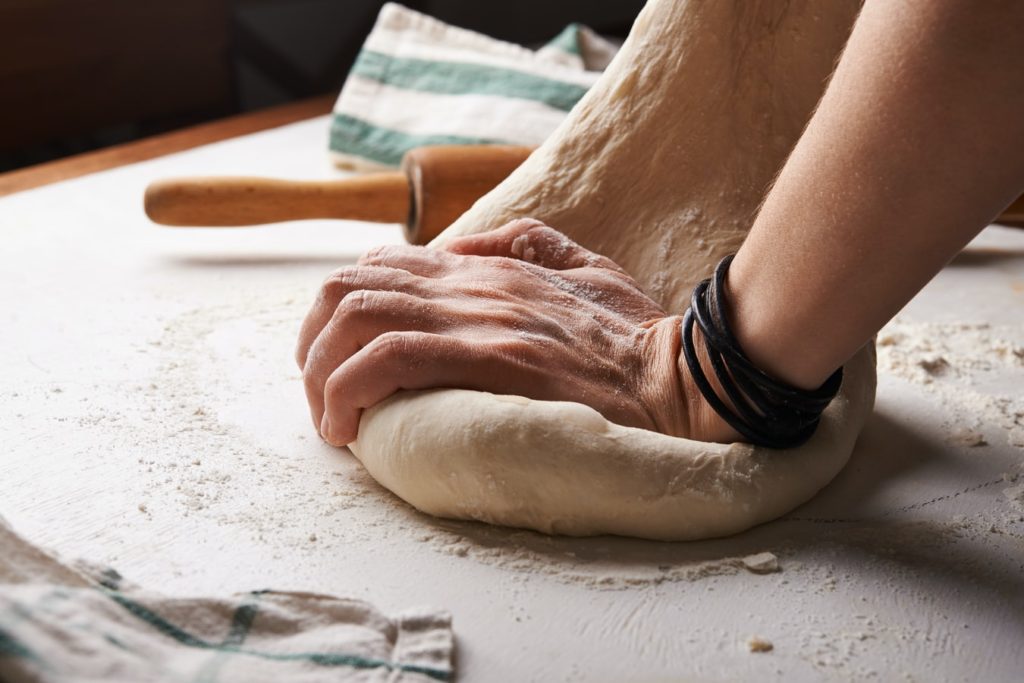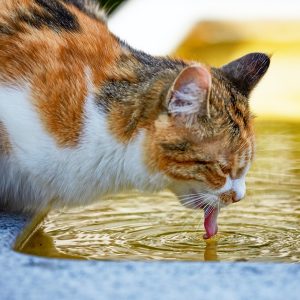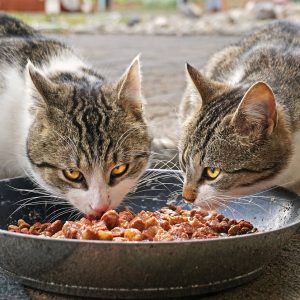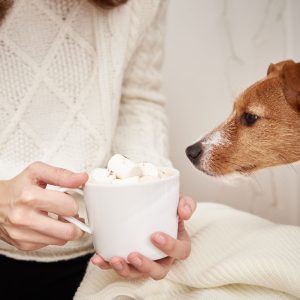Nothing beats the smell of fresh-baked bread. Whether you bake the bread yourself or pick it up from the bakery, that incredible aroma permeates the house like a heady perfume. My husband bakes great bread – with the careful supervision of our youngest cat (she oversees all baking and cooking in the household). While she doesn’t care for the results of our baking, the internet is filled with people’s stories of bread thieves. It’s enough to make you wonder: can cats eat bread?
Bread 101
People love bread. Why wouldn’t we? Those bundles of carbohydrates, fat, sugar, and fiber make us happy. With savory and sweet varieties, bread satisfies every palate. We even get important B vitamins (folic acid and niacin) from our carb delights. Where white bread found itself relegated to the unhealthy corner, most brands are now fortified with iron and calcium to provide better health benefits.
Sure, a 100% bread-diet won’t get recommended by any physician. Heavy carbohydrate loads predispose people to obesity. But a slice of toast here and there never hurt anyone. It seems like that same logic would apply to cats. So cats can eat bread, right?
That’s where we enter a grey zone.
Cat Diets
Cats are obligate carnivores. This means they MUST obtain their nutrition from meat sources (please stop trying to feed cats vegetarian diets). Cats derive essential amino acids (building blocks of the body) from the proteins in their diet. Amino acids build cells and complete a lot of daily functions throughout the body. An essential amino acid is one you NEED to obtain through your diet; your body can’t manufacture it. Cats require ELEVEN essential amino acids.
One of those vital amino acids is taurine. Not only does taurine provide your cat with healthy teeth and a shiny coat, but it also maintains their heart health. In 1987, researchers at UC Davis realized how vital taurine was for cats’ heart health. This is why the FDA now requires cat foods to contain taurine – it wards off dilated cardiomyopathy (DCM).
Cats and Bread
Bread contains a small amount of protein, but not much. It DOESN’T contain taurine. It also lacks the following nutrients that are essential in a cat’s diet:
- Omega-3
- Omega-6
- Vitamins A, C, D, E, and K
Remember those carbohydrates in bread? (Those carbs we love so much) Cats don’t need carbs in their diet. As a matter of fact, those very carbs, if overdone in amount or frequency, pose a unique threat people don’t consider.
See, cats aren’t born with food allergies. Instead, they develop them over time. If your cat eats bread, that regular exposure can cause them to develop an allergy to the carb ingredients (wheat, rye, etc.).
So CAN Cats Eat Bread?
Obviously, a lot of bread in your cat’s diet is a bad idea. However, you just caught your cat sneaking a bite of your toast. Is it the end of the world?
Probably not.
Per Dr. Gary Richter, Medical Director of the Montclair Veterinary Hospital and Holistic Veterinary Care, “Small amounts of grain can be okay in a balanced diet, but they should be kept to a minimum.” When it comes to baked bread, this equates to a cube the size of your fingernail.
Why? Again, it comes down to the balance of nutrients. That bread’s full of empty calories where your cat’s concerned. You want to aim for no more than TEN PERCENT of your cat’s diet for treats (ALL treats – not just bread). If your cat is a carb-fiend, opting for oats, barley, and whole-wheat breadcrumbs are better choices.
Can Cats Eat All Breads?
Not all bread is equal. There ARE bread varieties out there your cat CAN’T eat. Some options are downright dangerous, posing health hazards that’ll land your cat in the hospital. Before you relax your vigilance on the kitchen, make sure none of these hidden threats lurk on the counters or in the cabinets (since we know cats open cabinets – at least mine do).
Can Cats Eat Flavored Breads?
Plain, baked bread is safe for cats to eat. However, when was the last time you limited yourself to “ordinary?” Plenty of flavored options exist these days, and a lot of those additives are cat hazards:
- Coffee/Caffeine
- Chives
- Chocolate
- Garlic
- Leeks
- Macadamia nuts
- Onion
- Raisins
Even herbs and spices pose a risk. Unless you confirm they’re safe, steer clear of letting your cat eat those breads.
If you aren’t sure about an ingredient, or if you notice a nibbled slice (cats ARE sneaky), potential signs of toxicity range from mild to alarming. Your best bet is to contact your veterinarian ASAP. Meanwhile, you may observe any of the following:
- Lethargy
- Weakness
- Vomiting and/or diarrhea
- Decreased appetite
- Pale gums
- Fever
- Tremors
- Abdominal pain (they’ll hunch their backs or have trouble settling)
- Increased thirst
- Dark or orange-colored urine
- Decreased urination
- Disorientation
- Seizures
- Difficulty breathing
Can Cats Eat Bread Dough?

Do you have a baking supervisor in your house? (Ours INSISTS on being present) Maybe you don’t think anything of it. After all, you’ve noted yeast in the ingredients of your cat’s treats and supplements. Why fret if they snag a piece of bread dough? The problem is the yeast is different.
The yeast found in cat treats is INACTIVE. Those particular yeasts are byproducts incapable of fermentation (they can’t make products rise). If you’re a baker, you know dough depends on ACTIVE yeast to produce fermentation and cause the bread to rise. That very fermentation process is deadly to cats if ingested.
That process doesn’t stop when your cat eats the bread dough. According to Dr. Heather Loenser, Staff Veterinary Advisor at the American Animal Hospital Association (AAHA), “The biggest danger to cats would be eating raw dough because the fermentation from the yeast in the dough can cause the dough to expand in the cat’s stomach. This can cause severe abdominal pain, and theoretically, cause the stomach to perforate.” (Incidentally, this same process affects dogs, too – so NO ONE gets to eat raw yeast dough!)
Yeast doesn’t stop there, though. Even a small amount of raw pizza or bread dough with yeast can produce enough alcohol and carbon dioxide to harm your cat. Ethanol gets produced during fermentation, and the bloodstream absorbs the ethanol. Metabolic acidosis results, as well as inebriation, causing a condition known as alcohol toxicosis. This is an EMERGENCY!
NO RAW DOUGH!
Can Cats Eat Toast?
Toasted bread is the second-best smell behind baked bread. Sometimes toasters malfunction, though. (Or we forget the bread in the toaster oven) While most of us toss burned toast in the trash and start over, some people grudgingly accept the charcoal. If your cat happens to be underfoot, you might feel it’s acceptable to share.
Please don’t – and please don’t eat burned toast yourself.
Burned toast forms a compound called acrylamide. This dangerous chemical inflicts nerve damage and leads to cancer. NOT safe for your cat to eat OR you.
(Unburned, plain toast is safe)
When CAN Cats Eat Bread?
Bread CAN serve a valuable purpose for cat owners – even if your cat’s never shown an interest in your breakfast plate. White bread, in particular, rolls into balls with little trouble. This makes it a cinch to form around pills. If your cat turns their nose up at other pill-hiding methods, the yeast smell may appeal to them. You don’t need to use a lot of bread, either, so you won’t impact their diet.
Even liquid medication works with bread. Again, white bread soaks up medication rapidly. You then present the rolled ball to your cat. Your cat eats the bread and their medication all at once.
There’s no guarantee your cat will fall for the trick, but if you’re at your wit’s end, anything is worth trying.
Cats and Carbs
Can cats eat bread? They can but in very low moderation and tight restrictions (plain, baked bread ONLY). You want to keep your cat’s health at the forefront of your mind. However, if your cat has a carb-craving, a small piece of plain, baked bread here and there will not cause them harm.
Now, when they decide your fresh-baked bread makes a great new bed, that’s a different story.
Want more cat safety tips? Read our post about cat friendly flowers to find out what’s safe for your kitty!













No comment yet, add your voice below!